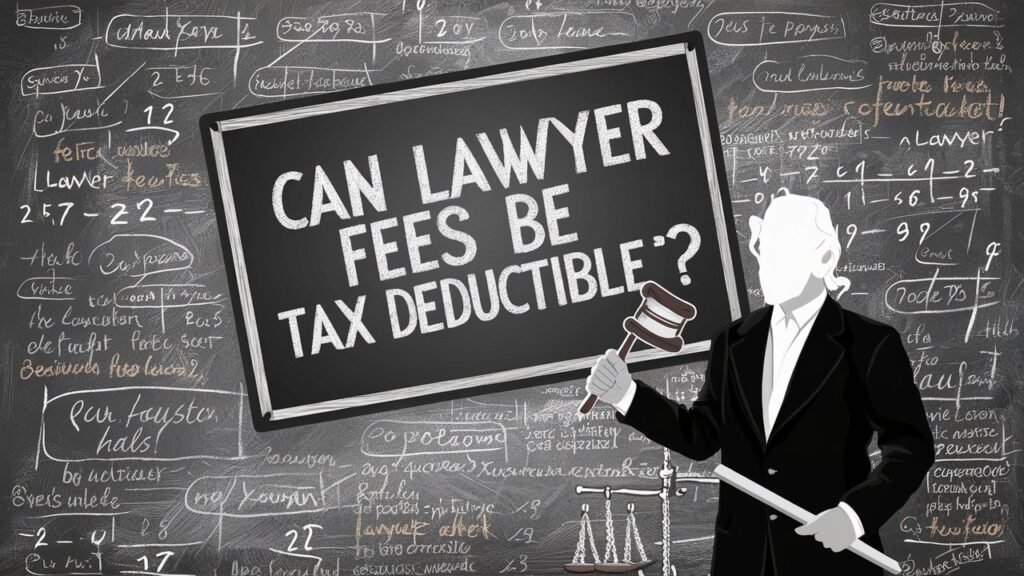Before delving into the specifics of lawyer fees, it’s essential to understand the concept of tax deductions. Tax deductions refer to expenses that can be subtracted from a taxpayer’s gross income, ultimately reducing the amount of income subject to taxation. However, not all expenses are eligible for deductions, and there are specific criteria that must be met to qualify.

Types of Lawyer Fees
Lawyer fees encompass a wide range of services, including but not limited to, legal consultations, representation in court, document preparation, and legal research. These fees can vary depending on the nature and complexity of the legal matter at hand.
Tax Deductibility of Lawyer Fees
The deductibility of lawyer fees depends on various factors, including the purpose of the legal services and the taxpayer’s individual circumstances. Generally, fees incurred for business-related purposes are more likely to be tax deductible than those for personal matters.
Personal vs. Business Legal Expenses
It’s crucial to distinguish between personal and business-related legal expenses when considering tax deductibility. While expenses incurred for personal matters, such as divorce or estate planning, are typically not deductible, those related to business activities may qualify for deductions.
Qualifying Legal Expenses
To qualify for tax deductions, legal expenses must meet certain criteria set forth by the Internal Revenue Service (IRS). Generally, expenses must be deemed ordinary and necessary for the conduct of business or the production of income. Additionally, expenses must be adequately documented and directly related to the taxpayer’s trade or business.
Documentation and Record-Keeping
Proper documentation and record-keeping are essential when it comes to claiming deductions for lawyer fees. Taxpayers should retain invoices, receipts, and any other relevant documents to substantiate their expenses in the event of an IRS audit.
Tax Planning Strategies
Maximizing deductions for lawyer fees requires careful tax planning. Working with a qualified tax professional can help taxpayers navigate complex tax laws and identify opportunities to minimize their tax liability.
Common Misconceptions
There are several misconceptions surrounding the deductibility of lawyer fees. For example, some taxpayers mistakenly believe that all legal expenses are tax deductible, while others may overlook certain deductible expenses due to lack of awareness.

Recent Changes in Tax Laws
Tax laws are subject to change, and recent legislative updates may impact the deductibility of lawyer fees. Taxpayers should stay informed about changes in tax laws and seek guidance from tax professionals to ensure compliance.
Case Studies
Examining real-life case studies can provide insight into the deductibility of lawyer fees in various scenarios. These examples illustrate how different factors, such as the purpose of the legal services and the taxpayer’s business activities, can affect deductibility.
Pros and Cons of Deducting Lawyer Fees
While deducting lawyer fees can result in tax savings, it’s essential to weigh the pros and cons carefully. Depending on the individual circumstances, the benefits of deductibility may outweigh the potential drawbacks, or vice versa.
Alternatives to Deducting Lawyer Fees
In some cases, there may be alternative tax-saving strategies available to taxpayers. Exploring options such as tax credits, deductions, or exemptions can help minimize tax liability without relying solely on deducting lawyer fees.
Tips for Taxpayers
For taxpayers seeking to maximize deductions for lawyer fees, there are several practical tips to consider. These include keeping accurate records, consulting with tax professionals, and staying informed about changes in tax laws.
Conclusion
In conclusion, while lawyer fees can represent a significant expense for taxpayers, they may also offer opportunities for tax savings. By understanding the rules and criteria for deductibility, taxpayers can navigate the complexities of tax law more effectively and potentially reduce their tax liability.
FAQs (Frequently Asked Questions)
- Are all lawyer fees tax deductible?
- No, not all lawyer fees are tax deductible. Generally, only those incurred for business-related purposes are eligible for deductions.
- Can I deduct legal expenses for personal matters, such as divorce or estate planning?
- In most cases, legal expenses for personal matters are not tax deductible. However, there may be exceptions in certain circumstances.
- What documentation do I need to support deductions for lawyer fees?
- Taxpayers should retain invoices, receipts, and any other relevant documents to substantiate their legal expenses.
- How often do tax laws regarding deductibility of lawyer fees change?
- Tax laws can change periodically, so it’s essential to stay informed about updates that may affect deductibility.
- Should I consult with a tax professional before deducting lawyer fees?
- It’s highly recommended to consult with a qualified tax professional to ensure compliance with tax laws and maximize deductions.

